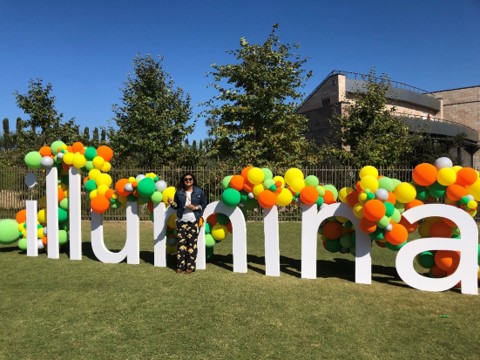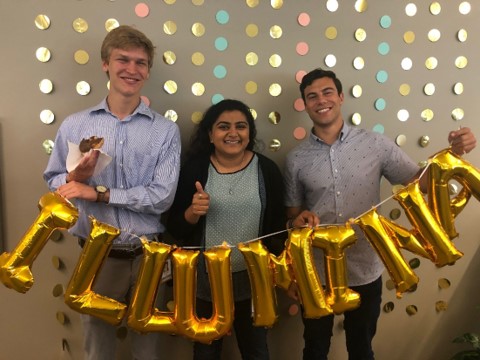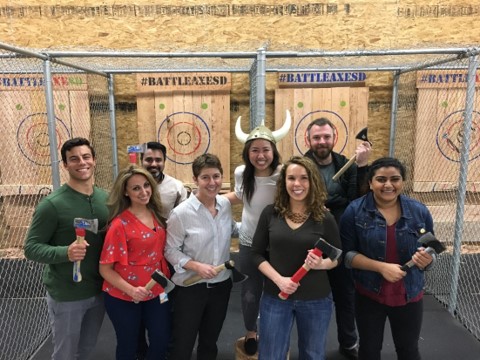A transformational journey into Healthcare Product Management
Healthcare tech is typically not seen in the same light as are other tech products. It does not garner the same widespread attention as compared to the next cloud offering for enterprises. However, its impact is as significant and widespread, if not greater. Maya Rajan, Class of 2020, shares her journey in the MBA program and her internship at Illumina, a genetic testing company based in San Diego, CA.
About the internship as Healthcare PM
Maya worked as a NextSeq Product Management intern at Illumina Inc. (NAS: ILMN). The NextSeq is one of Illumina’s sequencing devices, used to read and analyze DNA. Over the summer, Maya was tasked with generating unique customer insights and identifying market trends of sequencing devices via customer surveys. Additional tasks included having to validate an internal customer classification protocol, and subsequently use data provided by the strategy and sales teams to target and forecast company growth. The final presentation and poster at the end of the internship were delivered to a group of product managers and product strategy leaders. The findings and collateral were also presented publicly to all the employees and fellow interns at the company as part of the Intern Project Day.

At the Illumina Campus at San Diego
Why the MBA?
Maya had significant experience in the healthcare tech space before the MBA and had worked at Illumina in the Clinical Genomics Research Division. Day-to-day work involved supporting scientists and physicians to diagnose patients with rare and undiagnosed diseases through the power of clinical whole-genome sequencing. She started the MBA in August 2018 with the plan of moving closer to product management from project management. It was through the internship and MBA coursework over the first year that Maya was able to solidify her career aspirations in marketing and strategy.
Overcoming challenges
“Genetic testing, like many other areas of healthcare, is a field that is dynamic – constantly changing direction as innovation comes around the corner,” says Maya. Even though Maya came from the same technical field, so much had changed, and there was a feeling of being behind the curve on starting the internship. Maya came to understand the real problems customers face through meeting with key opinion leaders at the company, spending quite some time on developing skills, and leveraging the learning lab at Illumina. Being relentless in seeking out help when needed the most by asking questions of her manager and team was a key to overcoming the challenges posed.
Using the MBA experience
There were three major ways that Foster had prepared Maya for her internship. First, the classes taken in the first year, notably Intro to Marketing and Corporate & Competitive Strategy, provided her with the business acumen needed to succeed in strategic decision making. Next, during the applied strategy project with Naturebridge, a local non-profit organization, Maya applied business toolkits in real life to conduct market research and develop a go-to-market strategy. And finally, working closely with classmates with vastly varied backgrounds in her first-year core course teams, from K-12 educators to corporate finance whizzes, gave her the flexibility and skill to work with various Illumina teams and interns from different departments and backgrounds.

Hanging out with fellow interns
Gaining new skills
The internship experience pushed Maya to apply the business principles she learned in the classroom in the real world. There was a steep learning curve involved in pivoting from project management to product management. It was a joy for Maya to see how she could apply her newly gained business skills in a healthcare setting. Maya built a go-to-market strategy and positioning statement for a medical device in a niche B2B Healthcare space. In terms of technical expertise, Maya sharpened her existing skills in Tableau and other data analytics and visualization tools.
Tips for aspiring interns
Speaking through experience, Maya believes that being resilient and starting early is essential for all aspirants, especially those who want to land in niche fields. Internship recruiting is not easy, and it takes a tough mindset to keep pushing through. It never hurts to talk to more people interested in the same field as you, and opportunities can come in all types of ways – from LinkedIn to conversations in school corridors. For instance, Maya found that the University of Washington had a healthy ecosystem catering to healthcare tech. These include easily accessible resources at the Burke Center, which is part of the Foster School, or clubs like BioEngage and SEBA UW at other schools on campus. In addition, Maya expanded her network in the budding startup ecosystem by rubbing shoulders with like-minded entrepreneurs and inventors through the Holloman Health Innovation Challenge and the UW Co-motion labs. Maya also recommends that students think critically about what they want out of an internship. Rather than focusing on a company or a title, she focused on what potential learning opportunity she would secure, and the gap it would fill to advance her professional career in the long-term.

Having fun with the team
The final word
Back from the internship and gearing up to start full-time recruiting, Maya firmly believes it is essential to understand that an internship is not just a work experience, but much more of an opportunity to learn and solidify one’s career track. Hers is a story of being resilient during the internship search, and once there, learning as much as one could from the professionals around, from senior product managers to vice presidents. It helped a lot to be curious and, of course, have fun.
